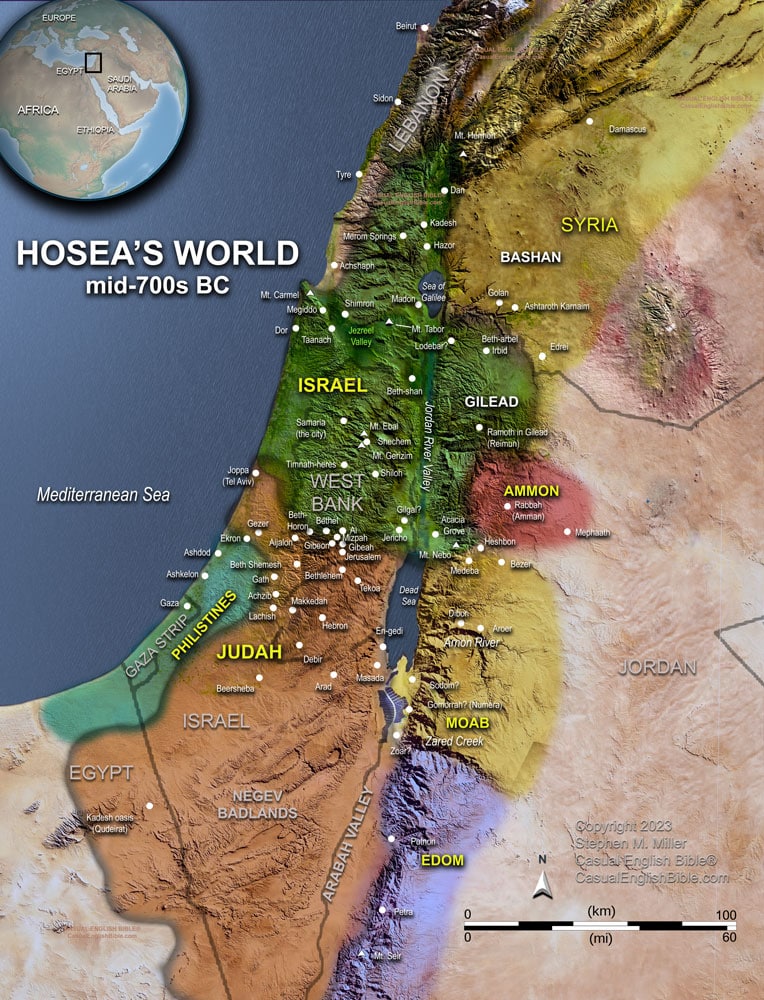Hosea 6
Get on good terms with God again
On the third day, rise and shine
1Come on, people. Let’s go back to God.Sure, the LORD tore us up.
But he can put us back together.
He hurt us. Now he can heal us.
2In two days, he’ll restore our health.
On the third day, we’ll rise and shine
While he watches over us.
Get to know your God
3Let’s get to know the LORD.Let’s discover all we can.
He’ll come to us, as sure as the sun rises.
And we’ll welcome him like spring rains
Coming to restore the earth.
4Ephraim, what am I going to do with you?
Judah, what on earth am I going to do with you?
Your love lasts about as long as mist in the morning.
It disappears like dew in the desert.
5With sharp words [1] I cut you to pieces.
I gave the order to take you down.
Justice comes as sure as the daylight. [2]
6I want enduring love,
Not occasional sacrifices.
I want you to get to know me
Not to merely visit,
Burn a sacrifice, and leave. [3]
7Adam broke our agreement.
The couple didn’t keep their word.
8Gilead [4] is sin city.
These people leave a trail of blood.
Ambushed by priests
9Your guild of priests is like a gang of robbersMurdering people on the road to Shechem. [5]
You commit despicable crimes.
10What I see in Ephraim’s Israel
Is horrible and sickening.
I see Ephraim normalizing prostitution.
You’ve contaminated all of Israel.
You’re unclean and unfit [6] to worship me.
11As for Judah,
I’ve marked a date on the calendar.
I’m going to restore you,
And make your lives good again.
Footnotes
Some scholars say this should read something like this: God “used the prophets to cut the people with his words.” Others say that’s awkward in the Hebrew and that with a slight break of one word into two, prophets disappear from this verse. Then it flows more naturally, and it’s all about the power of God’s word.
Israel and Judah couldn’t escape the punishment. It was too late. They had broken their covenant agreement with God. It was a contract as old as Abraham and Moses, an agreement promising that the people would obey God’s laws in exchange for God’s protection and for prosperity. But Israel’s obedience was like an on again and off again high school romance. Much more off than on—for centuries. God finally invokes the penalty clauses in the contract, unleashing the punishment (Deuteronomy 27). The worst of it is expulsion from the Promised Land. God kicks them out of town and country. Many die at the tip of an invader’s sword.
Jesus paraphrased this verse to Jewish religion experts giving him a hard time.
This “Gilead” isn’t the region of Gilead. That region is in what is now part of Jordan, along the eastern side of Jordan River, just south of the Sea of Galilee. This “Gilead” may be a short version of Ramoth-Gilead. An ancient Ugarit text from Syria mentions people in Gat-Gilead (Winepress-Gilead) in a list of cities.
There’s no way to know if Hosea was speaking in metaphor or flesh and blood fact. Shechem had been a holy city in the center of what became Israel since the time of Abraham. That’s where God told him the land would one day belong to Abraham’s descendants (Genesis 12:7). It’s possible some priests ambushed and murdered people they considered heretics or troublemakers. But it’s also possible Hosea was accusing the priests of murdering the genuine Jewish teachings with heresy. That tracks with what he said earlier (4:4, 7).
Prostitution rendered a person ritually unclean. In fact, all Jews were considered ritually unclean after having sex. They had to take a bath and wait until evening before they were ritually clean (Leviticus 15; Exodus 19:15). Only then could they go to the Jerusalem Temple and worship God.
Discussion Questions
- Sorry, there are currently no questions for this chapter.









